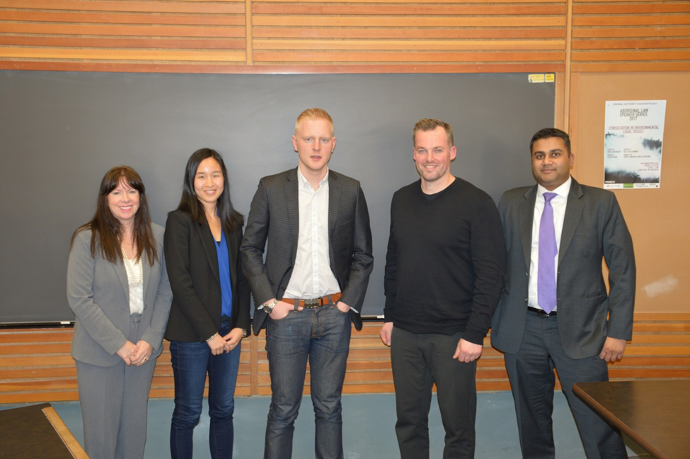
(L-R) Air Spray Ltd. President & CEO Lynn Hamilton; Director, Legal, WestJet Veronica Tang; UAlberta Law student and event MC Dane Patton; Director, Legal, WestJet Andrew Kay; DLA Piper Associate Prasad Taksal
Sir Adam Thomson, British aviation pioneer and founder of the UK's original low-cost carrier British Caledonian in the 1970s, once famously said of his industry: "A recession is when you have to tighten your belt; depression is when you have no belt to tighten. When you've lost your trousers-you're in the airline business."
As the four guest speakers at UAlberta Law's Law and Aviation Evening on Thursday, March 30 would reveal, little has changed in this regard.
"You've probably heard the cliché that the only way to become a millionaire in aviation is to start out as a billionaire," quipped Andrew Kay, Director, Legal at WestJet's Calgary head office.
"It's definitely not an industry to go into if you want to get rich. That said, it's an incredibly exciting industry to be in, and one that truly gets in your blood. If you're looking for an industry where you're dealing with the public on a daily basis in which all areas of law intersect, it doesn't get much more complex or interesting than this industry."
The March 30 panel featured WestJet in-house lawyers Kay and Veronica Tang, as well as aviation law expert Prasad Taksal (an associate at DLA Piper in Calgary) and Lynn Hamilton, the President and CEO of Edmonton-based aerial firefighting operator Air Spray Ltd., which her father founded in 1967. Together the four panelists represented the full breadth of legal career opportunities in aviation.
All four recounted their very different paths into the aviation industry. Tang, who joined WestJet as legal counsel in 2012 after five years of articling and associate work with Stikeman Elliott LLP in Calgary, had no particular prior interest in aviation or the airline industry but took to it quickly.
"The things you end up doing are extremely varied," she said.
"My work at WestJet has me involved, among other things, in aircraft purchasing. Recently I had the privilege of travelling with the company to the Boeing factory to inspect a new 737, and to accompany the plane to Calgary. Bringing a new plane on board is always a big deal for any airline, and being part of that is a lot of fun."
By contrast, Prasad Taksal's involvement in aviation law was driven by a love of aviation from the start, beginning as a newly minted lawyer in India in 2003 and continuing to his present work for major international carriers at DLA Piper.
"I work with multiple clients in multiple areas-that's the key difference between in-house and private practice," he explained.
"It's a truly international area of law with so many interesting dimensions to it. For anybody interested in international law, aviation is a great place to be."
In-house work for a single carrier, as Kay and Tang explained, is a somewhat different experience, but no less varied.
"When you're working in house for a company like WestJet you really get to go under the hood and see all the inner workings of the company," said Kay.
"You may be working for just one client, but the issues you're dealing with at any given time are probably more wide-ranging than what you'd be dealing with as an independent counsel. You also feel like you have a deeper vested interest in the wellbeing of the company and the direction of the business, and your judgment is perhaps trusted to a greater degree because you're seen as part of the team."
Given the high degree of public scrutiny faced by air operators and the primacy of ensuring safe, reliable operations, it is hardly surprising that lawyers play such a vital role in these companies' inner workings. In the case of Hamilton, a UAlberta LLB/MBA grad who also has a Master's of Law from the London School of Economics, she ended up returning to her roots after a career in finance law, where her combined legal and business administration background made her a perfect fit for the family business, first as legal counsel and later as chief executive officer.
"This business is never boring," said Hamilton, whose personal anecdotes include attending aircraft auctions in the jungles of Colombia and Honduras surrounded by armed militiamen.
For aspiring lawyers with an interest in aviation, the panelists recommend a solid general legal education, followed by hands-on experience working at a good, reputable law firm.
"Law firms are great at training you," said Tang.
"I think that with in-house work you have to be more of a generalist on the whole, and that was one of the things that I found the most challenging in the transition for me, as opposed to a law firm where specializing is encouraged."
Kay concurs, adding that positions like his do not typically open up on a regular basis, making it challenging to break into the industry.
"It's always a bit of a roll of the dice. But with some good experience with a larger firm and an interest-and hopefully some direct experience-in aviation, there are definitely opportunities."